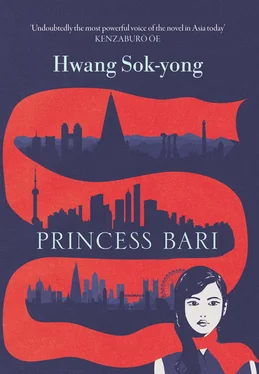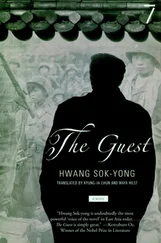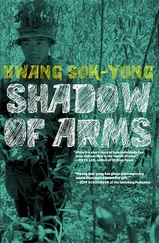Uncle Salamander took another shot of soju and leaned his head back.
“They make a living by selling girls like you. Which reminds me: I found your sister.”
“Mi? Where is she?”
He told me he’d tracked her down a long time earlier, through a younger colleague who owned a bar in Longjing.
“I told him I was looking for a girl from Musan and mentioned your father’s name and position. That’s how I found out where she is.”
I set my chopsticks down and was already halfway out of my seat.
“Let’s go to her now!”
“Hold on, there’s more to the story. Do you really think I would’ve stopped there?”
It seems the moment Mi crossed the Tumen River, she was scooped up by human traffickers and sold to a Han Chinese man in a village about sixty li outside of Longjing. Uncle Salamander was too bogged down with work to go look for her right away, but when some business came up that took him to Kaishantun, he set out to find her with only the name of the village written on a scrap of paper.
The place that greeted him at the end of the winding dirt road, dust clouds billowing around him as he went, was a remote mountain village. There were a dozen homes there, with both Han Chinese and Korean-Chinese. When he asked around about my sister Mi, a Korean- Chinese woman cautiously pointed to one of the houses. The two-room house, which was on the verge of collapsing, had a chicken coop to the side of the courtyard, a pen where they were raising pigs and corn and bean fields that started right behind the house and stretched back quite a way. At least it looked like they never had to go hungry.
“I’m pretty sure the only things of value in that shack were the piglets. They probably sold one to buy Mi. There was an old man loafing around in the courtyard, and I could hear a child bawling inside the house.”
Uncle Salamander said he’d combed his hair very neatly and wore a green jacket so he would look like a government official. He cleared his throat loudly and told the old man that he’d heard a North Korean girl was living there. When he asked where she was, the old man got angry and retorted that they’d spent good money on her only to have her run away. He said his son had gone searching for her all over, but the bastards who sold her to them said she wasn’t in China anymore.
“I didn’t want to tell you this part, but your sister had a baby with that man. The situation must have been really bad for her to abandon her child like that. As far as I can tell, she’s nowhere to be found anywhere near Yanji. In fact, you never know — she might have fled to South Korea. That would be a small mercy.”
I’d come to the restaurant expecting nothing, but there I was crying my eyes out in front of strangers for the first time in my life. I realized at last how numb I had become to the loss of my family. Or maybe I was crying over my own fate.
I took my uncle’s advice and did not say a word to my boss about leaving. Every day that week, when Xiang clocked out, I packed a few of my belongings and sent them with her, and that Sunday I got permission to go home with her again. The next day, the three of us boarded a train.
Dalian filled us with hope. The waterfront was beautiful, the city was clean and the parks were really well designed. Zhou’s friend, Chen, was originally from Dalian and had experience managing a sauna in Yanji. He’d purchased a commercial building on a small side street off of Anshan Street, one of the main roads downtown, and had redone the interior. It was an old, three-storey building, but the ivy climbing up the grey walls made it look nice. There was a restaurant on the first floor, and the foot massage studio was on the second floor. We rented a two-room flat on the third floor.
There were so many people looking for work in the city that when we posted job adverts in the newspaper and a local weekly magazine, women gathered like clouds. Xiang, Zhou and Chen sat inside, behind a desk, while I waited on a chair outside the door and called out names from the résumés we’d collected. The women were queued up all the way down the stairs, waiting to be interviewed. The top five all had massage experience, and we hired twenty more because they were pretty and looked like they were in good health. Chen told me only ten of them would end up employed. He was right: during the first week of training, led by Xiang and Zhou, five slipped out the exit and never came back. Then, when it was time for the grand opening, Xiang sent away five more who hadn’t shown any improvement.
Chen and Zhou printed up flyers and distributed them in bars, restaurants and teahouses. They charged much less than the fancy hotels, which had large saunas that offered both full-body and foot massages. Chen, drawing on his management experience, hired some teenagers who were loafing around nearby and offered them a commission on any customers they brought in. Zhou set up a separate room off to the side, where he provided acupuncture and cupping. We didn’t get the rich customers that the hotels got, but we did get small shop owners and people in town on business. Chen also went around to motels and inns and drew in visitors who were there on group tours. We made pretty good money for being a brand-new business. Chen had already become something of a community leader in the neighbourhood.
*
When I look back now on how I wound up crossing the ocean and coming all the way to England, I can’t help but blame my name. Grandmother told me the story of Princess Bari every night in our cosy little dugout hut, but it wasn’t until after I was on that ship that I thought about the princess going west in search of the life-giving water — out where the sun sets.
One day, Xiang and I were up on the third floor, sleeping in late, when we heard men arguing loudly downstairs. Their voices were punctuated by the sound of glass breaking. Startled, our eyes opened wide, and we heard a man’s high-pitched scream. It was Zhou. Xiang and I looked at each other, sprang out of bed and ran downstairs in our bare feet. The door to the massage studio was wide open. The first things I saw were glass shards and goldfish writhing and flapping around on the cement floor: the fishbowl was knocked off of the table. Four men stood over Zhou, who was sprawled on the floor, blood pouring from his head. Xiang shielded him with her body and yelled at the men.
“Who are you? How dare you hit him?”
One of them, a short, chubby man in his fifties, shook a piece of paper at her.
“Do you know what this is? It’s a promissory note. You think you can borrow someone else’s money and not pay it back?”
Xiang shook her husband and gave him a searching look. He grimaced and answered weakly: “I didn’t know either. They say Chen borrowed money from them.”
“Why are you responsible for Chen’s debts?”
In response to Xiang’s sharp tone, the older man let out a guffaw.
“Because he borrowed it under this shop’s name. You are business partners, aren’t you?”
A man with a shaved head pointed the jagged neck of a broken bottle at us and said: “Not even the deposit on this pathetic business of yours will be enough to pay back the principal.” Then he flung the broken bottle away.
Zhou, who’d already been on the receiving end of the bottle, cowered and crawled into Xiang’s arms. The men, back-alley loan sharks, threw open the doors and rummaged through every cabinet, going all the way up to the third floor, as if tallying up the value of every item and piece of furniture in the building.
The older man took off his suit jacket and unbuttoned his shirt.
“Come sit here,” he said to Zhou. “The rest of you should get lost.”
He glared at us as he said this, but instead Xiang dragged her husband over to the spot he’d indicated and crouched firmly beside him.
Читать дальше












